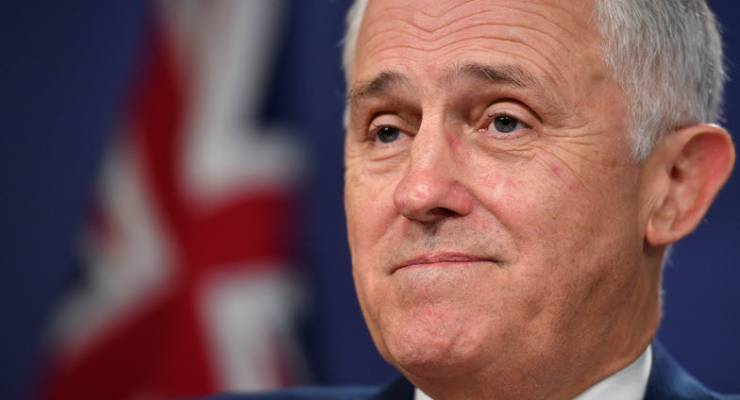
Something very unpleasant is happening with Malcolm Turnbull’s opposition to the Uluru Statement — almost as if the Prime Minister is intent on giving credence to suggestions he is dogwhistling on the issue.
Yesterday, speaking at a press conference with Jacinda Ardern, Turnbull repeated and re-emphasised the language he used in rejecting the Uluru Statement proposal for an Indigenous voice recognised in the constitution. “To have a national representative assembly, which is what we’re talking about here, which would be in the Constitution, and to which only Aboriginal and Torres Strait Islanders could be elected, is contrary to the principles of equality, of citizenship in Australia and it would inevitably be seen as a ‘third chamber’.”
“National representative assembly” is Turnbull’s own phrase, used more than once, to describe what the Uluru Statement described as “a First Nations voice enshrined in the constitution”. No one else has used “national representative assembly” to describe the idea — only the government in rejecting it. A cynical observer might suggest Turnbull is keen to reinforce the idea that the proposal is for some form of additional parliamentary assembly, to complement and support the fact that he keeps insisting it “will be seen as a third chamber”. It’s always “be seen as a third chamber” with the Prime Minister, rather than him coming out and calling it one, allowing him to hide behind the deliberate and malicious misrepresentation of the proposal by figures like Barnaby Joyce.
But as the rest of Turnbull’s statement yesterday indicates, that’s exactly how he wants people to view the proposal, when he says would be an assembly “to which only Aboriginal and Torres Strait Islanders could be elected… contrary to the principles of equality, of citizenship in Australia.” (Don’t laugh at the mention of citizenship please)
In Turnbull’s misrepresentation, Indigenous Australians would somehow get three votes, when everyone else only gets two — one for the House of Representatives, one for the Senate, one for what he calls the “national representative assembly”. “Every single Australian has the same right to vote and stand for and serve in our Parliament. Our national representative assemblies are our Parliament, our House and our Senate. Every Australian can aspire to that and that is critically important.”
Turnbull says this “third assembly” interpretation is “contested”. That’s like saying climate change is “contested” — it’s only contested by those of bad faith engaged in wilful misrepresentation. And the logic Turnbull is using to portray an Indigenous voice as inherently “unequal” is exactly that of the racist right opposed to any form of Indigenous recognition: that recognition of any kind is automatically unfair to non-Indigenous Australians, that Indigenous Australians have no special status derived from being the first peoples of this land, from being the ongoing survivors of a colonial occupation.
No wonder a huge range of non-Indigenous and Indigenous Australian figures and institutions are calling on Turnbull to rethink this. His response has occasioned deep anger, not merely by Indigenous figures like Noel Pearson, but conservatives who have backed an Indigenous voice. But his intemperate language and misrepresentation have painted the Prime Minister into a corner. And it’s where Indigenous recognition of any kind will die for now.








Turnbull has turned the corner. Many people, especially those of us who were targeted by Abbott’s dog whistling, were happy to see Turnbull take over because he could only be better than Abbott. With the inexplicable abandonment of the refugees in Manus and now the dishonest misrepresentation of the Indigenous consultation proposal Turnbull has become worse than Abbott. Abbot at least provided some form of security in his gulag and listened, or gave the appearance of listening, to Indigenous Australians.
I think that by now it should be pretty clear that Turnbull never really believed in the Republic idea either. He just used it as a vehicle in his strategy to raise his profile to a national level so he could try to enter Jerusalem being hailed with Hosannahs from a palm-waving crowd.
The contrast between Ardern and Turnbull is stark…NZ has a leader, we have a scumbag.
What is proposed then, if not a “National representative assembly”?
Here is the original Uluru Statement: https://www.1voiceuluru.org/the-statement/. Somehow Turnbull has leapt from the call for “the establishment of a First Nations Voice enshrined in the Constitution” to some invented assembly, which was never suggested.
It is a ‘First Nations voice enshrined in the Constitution’, according to the Uluru Statement.
And what are the possibilities for the shape that ‘First Nations voice’?
Those comprising the ‘First Nations voice’ would have to be elected surely?
And to be properly to be properly representative the ‘First Nations voice’ would have to comprise a fair number of people?
It’s a lay-down misere that; a) it’s members would exaggerate it’s importance, b) that the press would sensationalise the hell out of it, and c) that it would be referred to as a third chamber from day one.
Alternatives? Maybe ‘a third chamber’ would achieve more than the present two chambers. Ah well, we’ve kicked the shit out of them for 230 years and the ‘ Liberals’ are not for turning, so on with the show.
For the first 67 years of our history we had special laws to prevent Aboriginal people from taking part in our society. There are still provisions in the constitution that specifically allow racial targets from the government (See Hindmarsh Island and Howard). Now we cannot bring ourselves to have a body to ADVISE the parliament because it makes Aboriginal people different. Turnbull has joined the racist scum on the right and digs an even deeper pit of disgrace for our nation.
Just as there is no ‘legacy’ from the Abbott government, Turnbull’s prime ministership is equally scant. At least John Howard stood up for laws providing control of gun ownership.